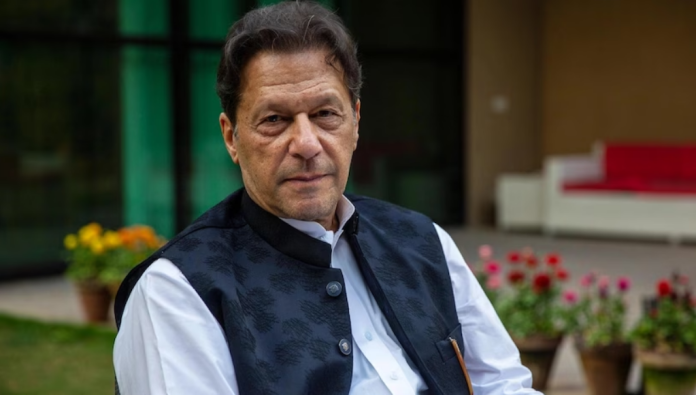—— Islamabad High Court had reserved the verdict on September 12
—— Former PM seeks his trial in the Cipher case to be shifted to Court
—— His counsel argues Law Ministry notification is based on ill intent
Staff Report
ISLAMABAD: The Islamabad High Court (IHC) will announce its reserved ruling on incarcerated Pakistan Tehreek-e-Insaf (PTI) Chairman Imran Khan’s plea against his trial in connection with the cipher case inside the jail premises today.
According to the cause list issued by the IHC registrar’s office, Chief Justice Aamer Farooq will announce the reserved verdict on Khan’s petition challenging the Law Ministry’s notification to hold his trial in jail in the diplomatic cable case. The IHC had reserved the verdict on September 12.
At the last hearing, Additional Attorney General Munawar Iqbal Duggal had told the court that the cipher’s hearing in Attock jail was one-time permission.
“The hearing on the case was held in [Attock] jail on August 30,” he had said, adding that the ministry had also issued a no-objection certificate (NOC) regarding the holding of trial in the prison.
At this, the IHC chief justice remarked that the jail trial was not unusual.
To which, the prosecutor said that the notification regarding moving the court to Attock jail was issued as per the law.
The court asked what would happen if the notification was issued again. “It has to be decided under what authority can the notification be issued,” the IHC judge observed.
PTI lawyer Sher Afzal Marwat had argued that the notification was based on ill intent.
“The application has not become ineffective, the court has to decide notification’s validity,” he added.
Imran to be indicted in cipher case on 17th
Last week, a special court established under the Official Secrets Act set October 17 as date for indictment of the PTI chairman and Vice Chairman Shah Mahmood Qureshi in the diplomatic cable case.
The PTI chief and his deputy were presented before Special Court Judge Zulqarnain in the court set up in Adiala Jail where both leaders are locked up.
The date for the indictment was set after the copies of the challan, submitted to the court by the Federal Investigation Agency (FIA), were provided to the counsels of the accused. After setting the date of the indictment, the government witnesses were also issued notices by the court.
During the hearing, Khan protested against the treatment meted out to him in Adiala Jail during the hearing of the cipher case and asked he be treated like other prisoners.
It is pertinent to mention here that Khan was arrested from his Zaman Park residence in Lahore soon after being convicted in the Toshakhana case in August.
A district and sessions court in the federal capital convicted the former prime minister — who was removed from office in April last year through a no-confidence motion — for corrupt practices related to the state gift depository — allegations which he denies.
The 70-year-old cricketer-turned-politician was accused of misusing his premiership to buy and sell gifts in state possession that were received during visits abroad and worth more than 140 million rupees ($635,000).
Cable gate
The controversy first emerged on March 27, 2022, when Khan — just days before his ouster in April 2022 — brandished a letter, claiming that it was a cipher from a foreign nation, which mentioned that his government should be removed from power.
He did not reveal the contents of the letter nor mention the name of the nation that had sent it. But a few days later, he named the United States and said that Assistant Secretary of State for South and Central Asia Affairs Donald Lu had sought his removal.
The cipher was about former Pakistan ambassador to the US Asad Majeed’s meeting with Lu.
The former prime minister, claiming that he was reading contents from the cipher, said that “all will be forgiven for Pakistan if Imran Khan is removed from power”.
Then on March 31, the National Security Committee (NSC) took up the matter and decided to issue a “strong demarche” to the country for its “blatant interference in the internal affairs of Pakistan”.
Later, after his removal, then-prime minister Shehbaz Sharif convened a meeting of the NSC, which came to the conclusion that it had found no evidence of a foreign conspiracy in the cipher.
The cipher case against the former premier became serious after his principal secretary Azam Khan stated before a magistrate as well as the Federal Investigation Agency (FIA) that the former PM had used the US cipher for his ‘political gains’ and to avert a vote of no-confidence against him.
The former bureaucrat, in his confession, said when he provided the ex-premier with the cipher, he was “euphoric” and termed the language a “US blunder”. The former prime minister, according to Azam, then said that the cable could be used for “creating a narrative against establishment and opposition”.
Azam said the US cipher was used in political gatherings by the PTI chairman, despite his advice to him to avoid such acts. He mentioned that the former prime minister also told him that the cipher could be used to divert the public’s attention towards “foreign involvement” in the opposition’s no-confidence motion.




